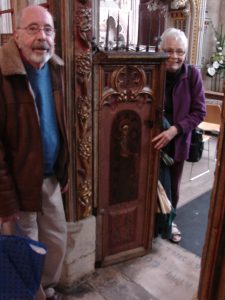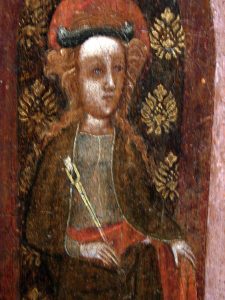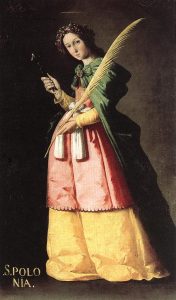 Recently, I have been discussing various medieval English place names found in specific books of my West Country Medieval Mystery Series featuring my heroine, the Lady Apollonia of Aust. Now, I would like to change topics and share why my lead character, Lady Apollonia, was named for Saint Apollonia.
Recently, I have been discussing various medieval English place names found in specific books of my West Country Medieval Mystery Series featuring my heroine, the Lady Apollonia of Aust. Now, I would like to change topics and share why my lead character, Lady Apollonia, was named for Saint Apollonia.
Saint Apollonia was a real person who lived in Alexandria, Egypt, at the beginning of the 3rd century AD. She was an elderly deaconess of the Christian church who was martyred in the middle of that century during a persecution of local Christians. She did not flee the persecution in her city but remained to provide comfort to other Christians. She was arrested and forced to sacrifice to the local gods. Refusing to do this, she instead made the sign of the cross and was persecuted by having all her teeth extracted. Finally, when confronted with death by burning, she leaped into the flames willingly.
She was initially venerated in Alexandria and eventually in the West where the Roman and Orthodox churches celebrate her feast day on February 9. She has been pictured since medieval times as a younger woman, not an aged deaconess, usually with a pincer holding a tooth in her hand. I am shown on the upper left, with our friend Phil Brockington, as we visited a representation of Saint Apollonia in Exeter Cathedral in England in 2018. A closeup, on the right of that same representation of Saint Apollonia, pictures her as less than aged. Her hand grasps a pincer holding a tooth as she became the patron saint of those who suffered toothache. A painting of Saint Apollonia by Zurbaran on the lower right portrays the same qualities. Saint Apollonia in our day is the patron saint of dentists,
To explain how Apollonia was named for this saint, I have extracted most of four paragraphs from Effigy of the Cloven Hoof. They explain the circumstances from the memories of Apollonia’s elder brother, Ferdinand:
 “Ferdinand’s thoughts turned back to the events surrounding the day of his sister’s birth as he galloped at the forefront of his troop. Ferdinand was eight years old at the time and regarded himself already a man. Although the passing years had robbed him of any memory of his mother’s face, he could vividly remember her swelling body awkwardly moving about the private apartments of his father’s moated manor house. His mother had been plagued continually by throbbing toothache through the whole of her pregnancy. She had been assured by her ladies that at the time of her birth travail the offending tooth could be extracted. Then, she was told, she would be so preoccupied with her labour that the pulsating pain of her jaw would sink from her consciousness, and the babe in her womb would not be threatened by the drawing of a rotten tooth.
“Ferdinand’s thoughts turned back to the events surrounding the day of his sister’s birth as he galloped at the forefront of his troop. Ferdinand was eight years old at the time and regarded himself already a man. Although the passing years had robbed him of any memory of his mother’s face, he could vividly remember her swelling body awkwardly moving about the private apartments of his father’s moated manor house. His mother had been plagued continually by throbbing toothache through the whole of her pregnancy. She had been assured by her ladies that at the time of her birth travail the offending tooth could be extracted. Then, she was told, she would be so preoccupied with her labour that the pulsating pain of her jaw would sink from her consciousness, and the babe in her womb would not be threatened by the drawing of a rotten tooth.
“His mother had a special altar to Saint Apollonia erected in the family chapel in honour of the protectress of this scheme. She struggled daily to carry her swollen body into its incense filled vaults. There she would offer her prayers for the safe delivery of her child and blessed relief from the ceaseless pain in her face. It seemed a perfectly reasonable safeguard, as everyone knew (that) … with the saint’s blessing, the birthing chamber would become the place of entry of a new life dedicated to her and would also provide the long-desired end to excruciating suffering which her martyrdom had memorialised.
“Ferdinand remembered that when the early pangs of her approaching labour began, his frail mother seemed more than ready to get on with it. He and his father went off early in the morning, leaving the women of the household in charge. They learned of the birth of a girlchild when the father and son returned late from the day’s hunt. The saint had heard his mother’s prayers, Ferdinand was told, and his healthy baby sister had been safely delivered. His mother too had achieved release from her agonising pain.
“He could remember visiting her bedside, repulsed by the hot, fetid air of the chamber. To his boyish eye, the dreadful disarray of his mother’s hair, damp and stringing limply across her grey, drawn face, was most alarming. Still, she had seemed wonderfully happy, smiling ecstatically as she cried aloud to unseen spirits, ‘Blessed Apollonia, you are merciful. Gratia, gratia plena. My daughter shall bear your name and that of the Blessed Virgin.’”
I will continue my comments next month. Please join us then.